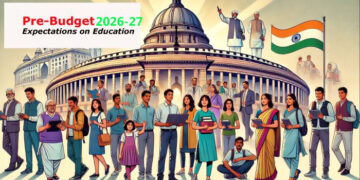Autar Nehru
After the report of the union Ministry of Education appointed Dr. K. Radhakrishnan-led Overarching Committee was made public on May 12 for consultations, the reforms and restructuring of the assessment and accreditation processes and apparatus for of HEIs (about 1,113 universities and 43,796 colleges) in India, have moved into a critical but transformational phase. The current accreditation mechanism under the National Assessment and Accreditation Council (NAAC) is going to be overhauled by the end of the year.
The Overarching Committee formed in November 2022 under Dr. Radhakrishnan, a former ISRO chief and currently Chairman BoG, IIT Kanpur & Chairperson of the Standing Committee of IIT Council, to prepare a roadmap for aligning NAAC, NBA, and NIRF for the proposed National Accreditation Council (NAC), a vertical in yet to be set up Higher Education Commission of India (HECI) as proposed in the NEP 2020, has also recommended a calendar for this consultation and set the target of switching to a new system on December 31, 2023. The eight-point system followed by the NAAC will change to a binary accreditation system with just three outcome categories (accredited, not accredited and accreditation) instead of NAAC grades and scores. Also, it will pave way for multiple accreditation agencies to operate in the country right from the school level.
The new system will also bring the Indian Institutes of Technology (IITs currently follow their internal systems for periodic peer evaluation and assessment of programs under the ambit of the unified accreditation process under the proposed NAC.
If everything goes as per the fixture in the report, ‘One Nation One Data Platform‘ , which is to be up gradated for this purpose could became the only interface for HEIs to upload their data for multiple agency use including accreditation bodies and NIRF from next year onward.
It is pertinent to mention that the Radhakrishnan Overarching Committee was constituted in the backdrop of the furor over the ‘corrupt’ and ‘opaque’ working of the current accreditation process under NAAC last year. And, therefore, the committee has taken into account various reports, perceptions, suggestions and stakeholder feedback in preparing the report. The other members of the committee are Prof. Mridul Hazarika Vice-Chancellor, Mahapurusha Srimanta Sankaradeva Viswavidyalaya, Assam, Prof. Bharat Bhasker Professor, IIM Lucknow (Director IIM Ahmedabad) and Joint Secretary, Higher education (MoE).
The National Assessment and Accreditation Council (NAAC) established in 1994 as an autonomous institution of the University Grants Commission (UGC) evaluates the institutions for its conformance to the standards of quality in terms of its performance related to the educational processes and outcomes, curriculum coverage, teaching-learning processes, faculty, research, infrastructure, learning resources, organisation, governance, financial wellbeing and student services on a scale of 0-5 in grades of A,B,C,D. A is the highest grade starting with a score of 3 and above while a D stands for not accredited for a score less than 1.5. Till now, NAAC has accredited 418 universities and 9,062 colleges.
The working of NAAC came under serious doubt in last a few years after Siksha ‘O’ Anusandhan (SOA) Deemed to be University in Odisha secured the highest rating of 3.88 much above the world ranked intuitions like IISc and other reputed HEIs. Half a dozen private universities too received inflated scores and in one instance in the case of Maharaja Sayajirao University of Baroda, allegations of bribing through gold and huge money were made.
The underhandedness of NAAC may have been widely held by observers but it was only after Prof Bhushan Patwardhan, who became its chairman in February 2022 that the nature and scale of malpractices came to light and expedited the discussions on an enabling, robust and transparent accreditation system. Patwardhan, who resigned in March 2023 in protest in explicit words caught the state of NAAC in his resignation letter to the UGC chairman. “On receiving various complaints from the stakeholders, and review committee reports, I had expressed my apprehensions earlier about the possibility of vested interests, malpractices, and nexus among the persons concerned, offering thereby a green corridor by presumably manipulating ICT, DVV and PTV (reports based on which assessment is carried out and grades awarded) processes leading to the awarding of questionable grades to some HEIs,” he wrote.
The leaked portions of Joorel Committee report (JP Singh Joorel, director of Information and Library Network was the chairman of the enquiry committee that Patwardhan had set up) said there were several irregularities in the NAAC’s accreditation procedure. The IT system was discovered to be “compromised” with opacity, mistakes and gaps. The panel found that NAAC doesn’t own data entre and around 70 percent of the 4,000 assessors who make up the pool of specialists “have barely got the chance to visit sites while the remaining visited the sites many times.” Similarly there are allegations of plagiarized self-study reports (SSR) submitted by candidate institutions along with qualitative issues of Data Verification and Validation (DVV) partners.
Setting up of the Dr. K. Radhakrishnan Overarching Committee and appointment of Dr Anil Sahasrabuddhe in place of Patwardhan are seen as a cleanup act by the government. Speaking at a recent ASOCHAM education conference, Sahasrabuddhe, a former AICTE chairman who is now also the chairman of newly constituted National Educational Technology Forum (NETF) as well as NBA, said upgradation of ‘One Nation, One-Data Platform’ was needed to weed out suspicion, reduce work and create validated data of education sector for use by various agencies and departments. “For quality of evaluation or other purposes various central and state agencies seek data from institutions from time to time and more than 90% data is same in all cases though formats may be different. So, whenever, there is mismatch, suspicion arises. Therefore, ‘One Nation, One Data Platform’ which as proposed will require data uploading once a year by the institution, will then be authenticated and validated and will be available to such agencies,” he said.
A move to a binary accreditation system, making the exercise ‘outcome-centric’, setting up a new body for data validation and verification, use of crowdsourcing for verifying data, single-point data entry through use of APIs, penalty for wrong-submissions and mentoring of institutions falling below standards are some of the major recommendations made by the Overarching Committee.
Therefore all eyes will be on the proposed transition as to how it will affect and correct the fallacies of the present system and set ball rolling for entry of multiple accreditation agencies. As accreditation and rankings are used for choice by students, the impact of these changes will be felt by all stakeholders from next year.














